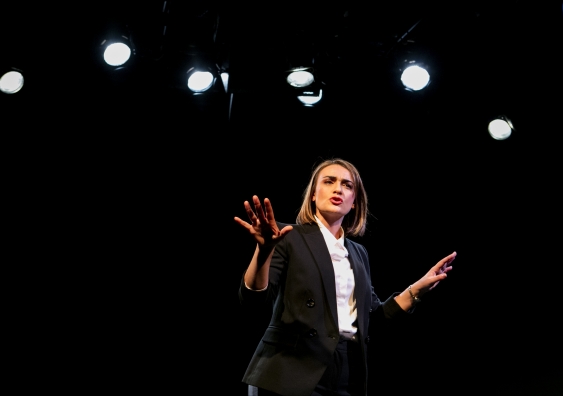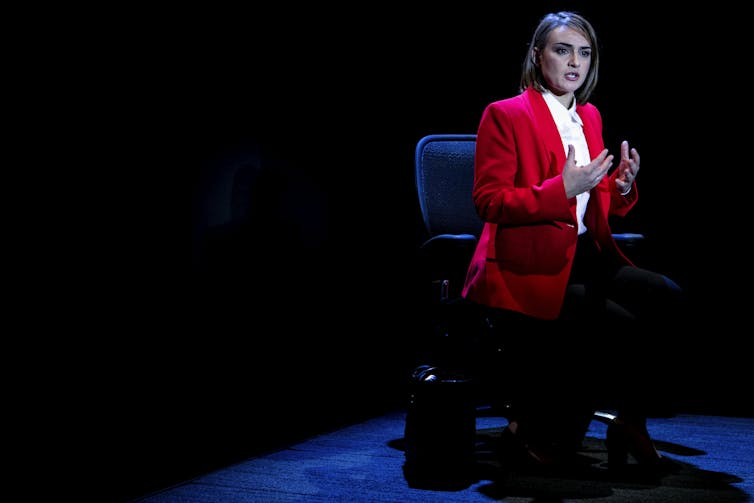In Suzie Miller's Prima Facie, theatre finds a voice of reckoning on sexual assault and the law
Written by a former lawyer, a new play presents a forceful critique of the Australian legal system's treatment of sexual assault.
Written by a former lawyer, a new play presents a forceful critique of the Australian legal system's treatment of sexual assault.

Review: Prima Facie, Griffin Theatre Company
Suzie Miller’s one-woman play Prima Facie is an unsparing study of the Australian legal system’s treatment of sexual assault cases. The play, which opened to standing ovation, concludes with a simple but compelling statement – spoken by the character Tessa, played by Sheridan Harbridge – “something has to change”.
This is not a plea, and it is more forceful than a call-to-arms. It is a voice of steely reckoning that contains within its very timbre the rage of being a woman. The voice not only carries the rage – its strength comes from having been conditioned by it.
Tessa is a criminal defence barrister who is proudly at the top of her game, having conquered class and gender barriers to get there. She enjoys the pace of the kill and plays expertly on witness vulnerabilities, with sleek mastery of the unemotional palette needed to win.
In the words of 1980s feminist playwright Caryl Churchill, Tessa is a “top girl”, a career woman who believes she has accessed patriarchal power by reaching the higher echelons of her field.
Then Tessa is raped by a colleague. Her journey is one from enabler of the legal system to its victim. It shows how rape ruptures not only body and psyche, but the narrative that binds them together. Yet the legal system expects coherence. Where rape ruptures sense of self, the legal system demands that a witness speak from a place of reasoned agency.
In Prima Facie, Sheridan Harbridge plays Tessa, a criminal lawyer at the top of her game. Image from Brett Boardman
In the age of #MeToo, Prima Facie puts on the record that women’s experiences of assault have been silenced for as long as women have been abused by men and systems of power. It offers similar insight into the legal system to Queensland author Bri Lee’s award-winning 2018 memoir, Eggshell Skull.
The play states the problem plainly:
A woman’s experience of sexual assault / does not fit the male-defined system of truth. So it cannot be truth / and therefore there cannot be justice.
Miller’s text won last year’s prestigious Griffin Award for an outstanding play or play or performance text that displays an authentic, inventive and contemporary Australian voice. It is easy to see why. It is punchy, leaving almost no time for pause – witty and despair-making in equal measure.
Harbridge is dynamic as she moves Tessa through varying social vernaculars (such as when she imitates her Mum) and into a range of emotional tempos, activating every angle of an increasingly suffocating stage. Barring one exit, Tessa spends 100 minutes on a raised platform that feels much more confining than the usually intimate space of Sydney’s Stables Theatre. Most often starkly lit, and before an audience who plays quasi-theatrical jury, Harbridge does not miss a beat.
Sound is used only occasionally, with the depth of an inner eardrum/heart beat. Sparing projections mark the shifts in time as well as the legalese that Tessa traverses. The understated elegance of these elements allow the physical detail to mould the weight of the story: the rhythmic nuances of Miller’s script, their expression through Harbridge’s Tessa, and their unflinching, empathic direction by Lee Lewis.

Miller’s play is punchy, witty and despair-making. Image from Brett Boardman
This production seems to make clear that beyond the law, it is female labour - in myriad guises - which tries to change the present in view of its history.
Structurally, the play performs a process of finding voice. Narratively, this is conveyed as Tessa’s coming to terms with her own experience – a conflict that she describes as landing between “legal truth” and autobiographical truth. Beyond this particular story, the process of finding voice becomes a comment on the theatrical form itself. Where legal avenues fall short, theatre can testify, the play seems to declare – only it does so differently, and for different ends.
In her program notes, Miller draws her background as a lawyer into focus, explaining that the work “has been playing out in [her] mind since [her] law school days”. The implication here is that the inadequacies of the legal system in part led Miller to carve new ways of making justice happen. In the play, Tessa finds her voice, explaining, “it’s a different voice, but I keep talking”. Perhaps this is a subtle nod to Miller’s own trajectory into the realm of theatre-as-tribunal.
Prima Facie shows how rape becomes nullified by the legal system, which fails to recognise the ways in which this form of violence shatters. Prima Facie’s strength is that it fashions itself out of the shards of this shattering. And this is why it is so compelling and so resonant.
Prima Facie is on at SBW Stables Theatre in Sydney until June 22.
Bryoni Trezise, Senior Lecturer in Theatre and Performance Studies, UNSW
This article is republished from The Conversation under a Creative Commons license. Read the original article.
![]()